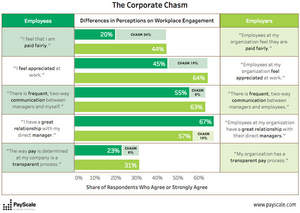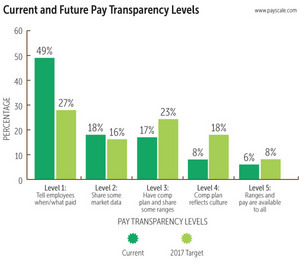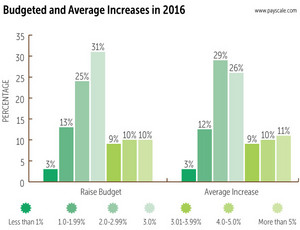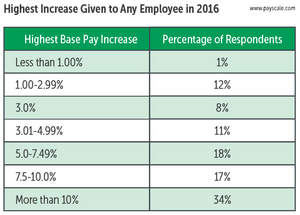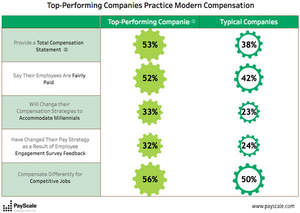SEATTLE, WA--(Marketwired - Feb 15, 2017) - Today, PayScale, Inc. -- the leader in cloud compensation solutions -- released the 2017 Compensation Best Practices Report (CBPR). Based on data from 7,700 survey respondents representing executives, line of business managers, human resource leaders and compensation practitioners, the report reflects current attitudes about compensation, business growth, hiring and retention. The latest annual report shows a shift is underway at many companies as key talent markets are becoming increasingly competitive.
More specifically, organizations are now taking an updated approach to their pay policies and processes to build trusting relationships with employees and drive deeper engagement. However, the research also shows a corporate chasm still exists around compensation, as employers were more than twice as likely as employees to believe pay is already fair. Employers can do even more to modernize their pay practices, such as increase pay transparency, use current market data to set pay and train managers to initiate open dialogue about pay so their employees feel valued and -- ultimately -- don't look for greener pastures elsewhere.
"Our most recent research shows that many companies are moving away from pay as a transactional experience that has historically been shrouded in secrecy. We're also seeing that 'how' a company pays is really as important as 'what' a company pays its employees," said Mike Metzger, president and CEO at PayScale. "Compensation policies reflect the culture at an organization. Employers who pay fairly for competitive positions and foster open dialogue around pay will build more trusting relationships with their employees that, in turn, will impact the bottom line."
Here are some of the key findings about pay practices and employer attitudes from the 2017 Compensation Best Practices Report, including compensation approaches from top-performing companies:
- Employers and employees disagree on "fair pay." Forty-four percent of employers say their employees are fairly paid, but only 20 percent of employees agree.
- Organizations set their sights on increased transparency. Currently, 31 percent of organizations identify themselves as being transparent (a level three or greater on PayScale's Pay Transparency Spectrum). Nearly half of all organizations aim to be transparent in 2017 (49 percent).
- 2016 marks the return of cash. Thirty-four percent of organizations say the highest base pay increase they gave to an employee topped 10 percent. In addition, 11 percent reported an average increase over 5 percent.
- The C-Suite cares even more about comp. Fifty-seven percent of organizations agree that employee compensation is becoming more important to their executives.
- Fresh data is critical. While 53 percent of organizations have done a full market study within the past year, 47 percent reference market data for individual jobs more frequently than annually. Thirteen percent do so at least weekly and that number rises to 39 percent among enterprise organizations.
- Top-performing companies pay differently:
- They are more likely to pay higher for their most competitive jobs that impact the bottom line.
- They are more likely to train their managers to talk with employees about pay.
- They are more likely to say that they pay their employees fairly; 52 percent versus 42 percent of typical companies.
"Companies are always looking to get more returns from their talent investments and drive deeper employee engagement. I've found that managers who are committed to building open and transparent relationships with their employees are much more likely to see an increase in job satisfaction," said William Tincup, president of Recruiting Daily. "The PayScale research is compelling because it shows that an honest compensation dialogue can dramatically improve engagement and the only cost to the company is a manager's time."
A top-performing company in the CBPR was one that met or exceeded its financial performance in the previous year and identified itself as the leader in its industry. To view the entire Compensation Best Practices Report, please visit: http://www.payscale.com/cbpr
About PayScale:
PayScale offers modern compensation software and real-time, data driven insights for employees and employers alike. More than 6,000 customers, from small businesses to Fortune 500 companies, use PayScale to power pay decisions for more than 13 million employees. These companies include Dish Network, Getty Images, Skullcandy, Bloomberg BNA and Time Warner. For more information, please visit: www.payscale.com or follow PayScale on Twitter: http://twitter.com/payscale
Contact Information:
Press Contact:
Phyllis McNeice
Email: press@payscale.com
Tel: 206-954-1481
